Social Psychology in Understanding Organisational Behaviour
VerifiedAdded on 2023/06/10
|7
|1444
|132
Report
AI Summary
This report delves into the intricate relationship between social psychology and organizational behavior, focusing on how understanding social psychology can help explain and manage conflicts within organizations. It analyzes potential conflicts, cooperation, and decision-making across different generations in the workplace, considering perceptions of inequality, fairness, and discrimination. The report critically examines how generational shifts impact workplace dynamics, addressing relationship and task conflicts arising from differing values and work styles. It concludes that social psychology provides valuable frameworks for conflict management and fostering a more inclusive and productive work environment. The report highlights the importance of recognizing and addressing the diverse perspectives of different generations to mitigate discrimination and promote fairness within the organization.
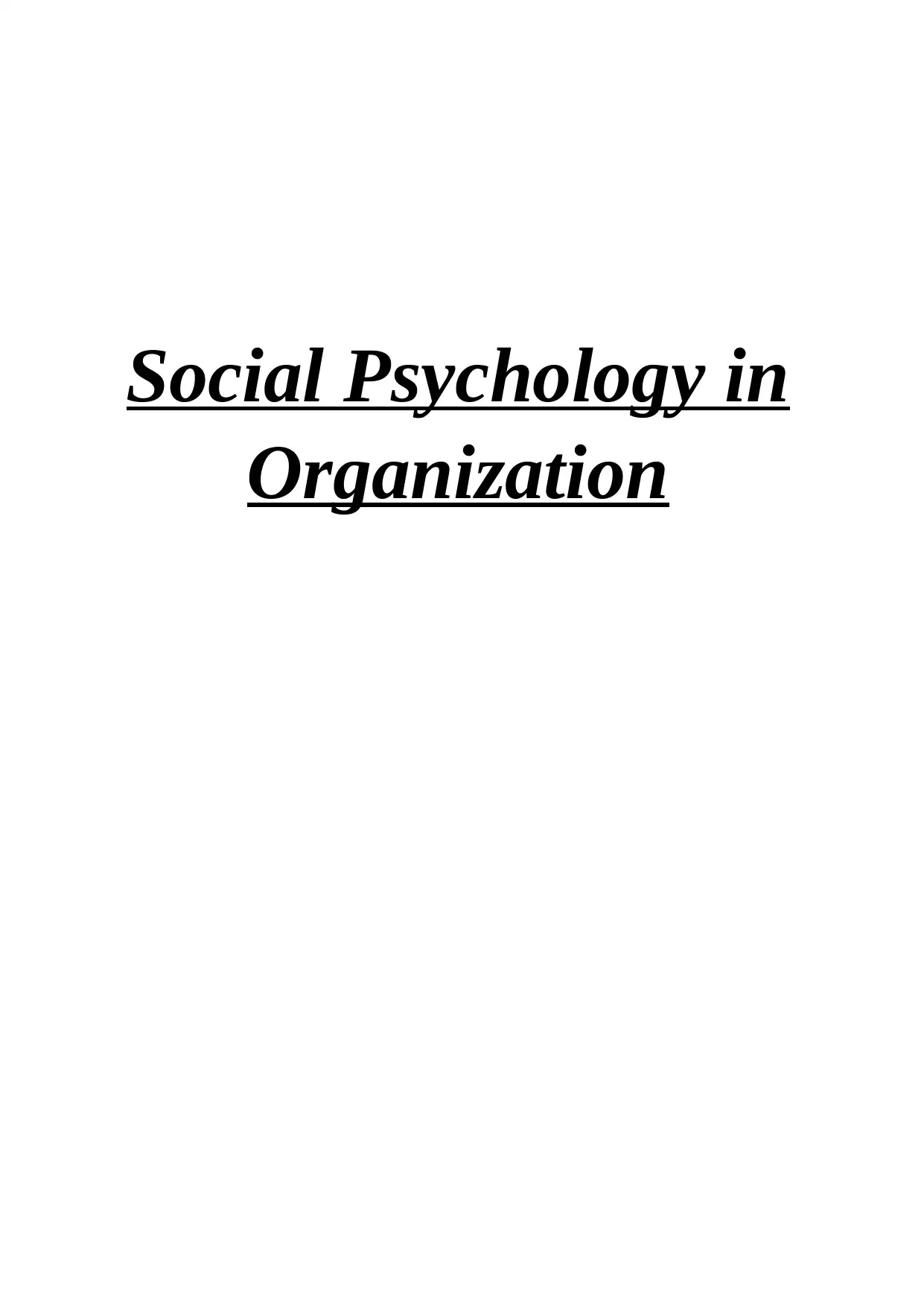
Social Psychology in
Organization
Organization
Paraphrase This Document
Need a fresh take? Get an instant paraphrase of this document with our AI Paraphraser

Contents
INTRODUCTION....................................................................................................................3
MAIN BODY............................................................................................................................3
CONCLUSION.........................................................................................................................5
REFERENCES.........................................................................................................................7
INTRODUCTION....................................................................................................................3
MAIN BODY............................................................................................................................3
CONCLUSION.........................................................................................................................5
REFERENCES.........................................................................................................................7
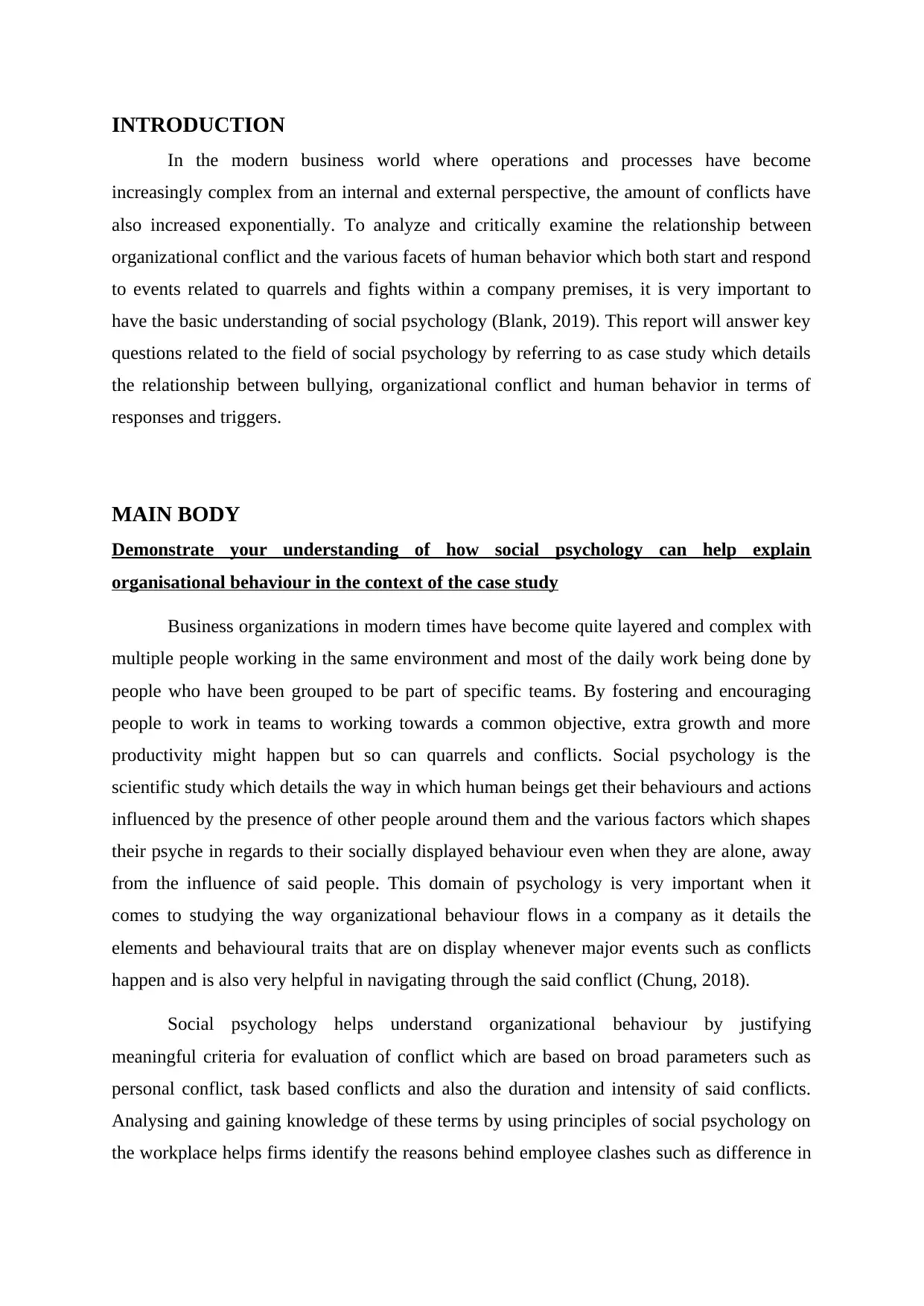
INTRODUCTION
In the modern business world where operations and processes have become
increasingly complex from an internal and external perspective, the amount of conflicts have
also increased exponentially. To analyze and critically examine the relationship between
organizational conflict and the various facets of human behavior which both start and respond
to events related to quarrels and fights within a company premises, it is very important to
have the basic understanding of social psychology (Blank, 2019). This report will answer key
questions related to the field of social psychology by referring to as case study which details
the relationship between bullying, organizational conflict and human behavior in terms of
responses and triggers.
MAIN BODY
Demonstrate your understanding of how social psychology can help explain
organisational behaviour in the context of the case study
Business organizations in modern times have become quite layered and complex with
multiple people working in the same environment and most of the daily work being done by
people who have been grouped to be part of specific teams. By fostering and encouraging
people to work in teams to working towards a common objective, extra growth and more
productivity might happen but so can quarrels and conflicts. Social psychology is the
scientific study which details the way in which human beings get their behaviours and actions
influenced by the presence of other people around them and the various factors which shapes
their psyche in regards to their socially displayed behaviour even when they are alone, away
from the influence of said people. This domain of psychology is very important when it
comes to studying the way organizational behaviour flows in a company as it details the
elements and behavioural traits that are on display whenever major events such as conflicts
happen and is also very helpful in navigating through the said conflict (Chung, 2018).
Social psychology helps understand organizational behaviour by justifying
meaningful criteria for evaluation of conflict which are based on broad parameters such as
personal conflict, task based conflicts and also the duration and intensity of said conflicts.
Analysing and gaining knowledge of these terms by using principles of social psychology on
the workplace helps firms identify the reasons behind employee clashes such as difference in
In the modern business world where operations and processes have become
increasingly complex from an internal and external perspective, the amount of conflicts have
also increased exponentially. To analyze and critically examine the relationship between
organizational conflict and the various facets of human behavior which both start and respond
to events related to quarrels and fights within a company premises, it is very important to
have the basic understanding of social psychology (Blank, 2019). This report will answer key
questions related to the field of social psychology by referring to as case study which details
the relationship between bullying, organizational conflict and human behavior in terms of
responses and triggers.
MAIN BODY
Demonstrate your understanding of how social psychology can help explain
organisational behaviour in the context of the case study
Business organizations in modern times have become quite layered and complex with
multiple people working in the same environment and most of the daily work being done by
people who have been grouped to be part of specific teams. By fostering and encouraging
people to work in teams to working towards a common objective, extra growth and more
productivity might happen but so can quarrels and conflicts. Social psychology is the
scientific study which details the way in which human beings get their behaviours and actions
influenced by the presence of other people around them and the various factors which shapes
their psyche in regards to their socially displayed behaviour even when they are alone, away
from the influence of said people. This domain of psychology is very important when it
comes to studying the way organizational behaviour flows in a company as it details the
elements and behavioural traits that are on display whenever major events such as conflicts
happen and is also very helpful in navigating through the said conflict (Chung, 2018).
Social psychology helps understand organizational behaviour by justifying
meaningful criteria for evaluation of conflict which are based on broad parameters such as
personal conflict, task based conflicts and also the duration and intensity of said conflicts.
Analysing and gaining knowledge of these terms by using principles of social psychology on
the workplace helps firms identify the reasons behind employee clashes such as difference in
⊘ This is a preview!⊘
Do you want full access?
Subscribe today to unlock all pages.

Trusted by 1+ million students worldwide
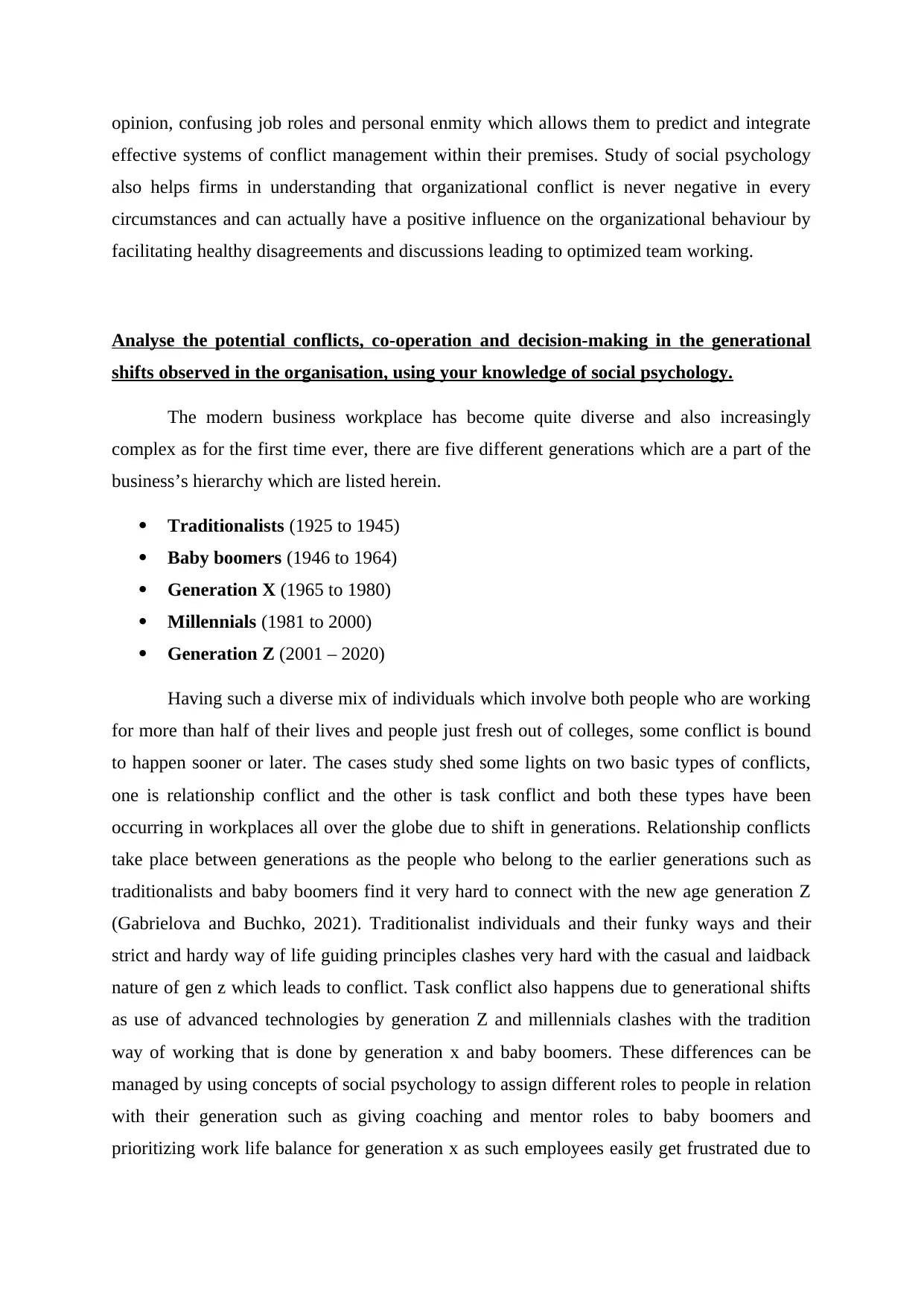
opinion, confusing job roles and personal enmity which allows them to predict and integrate
effective systems of conflict management within their premises. Study of social psychology
also helps firms in understanding that organizational conflict is never negative in every
circumstances and can actually have a positive influence on the organizational behaviour by
facilitating healthy disagreements and discussions leading to optimized team working.
Analyse the potential conflicts, co-operation and decision-making in the generational
shifts observed in the organisation, using your knowledge of social psychology.
The modern business workplace has become quite diverse and also increasingly
complex as for the first time ever, there are five different generations which are a part of the
business’s hierarchy which are listed herein.
Traditionalists (1925 to 1945)
Baby boomers (1946 to 1964)
Generation X (1965 to 1980)
Millennials (1981 to 2000)
Generation Z (2001 – 2020)
Having such a diverse mix of individuals which involve both people who are working
for more than half of their lives and people just fresh out of colleges, some conflict is bound
to happen sooner or later. The cases study shed some lights on two basic types of conflicts,
one is relationship conflict and the other is task conflict and both these types have been
occurring in workplaces all over the globe due to shift in generations. Relationship conflicts
take place between generations as the people who belong to the earlier generations such as
traditionalists and baby boomers find it very hard to connect with the new age generation Z
(Gabrielova and Buchko, 2021). Traditionalist individuals and their funky ways and their
strict and hardy way of life guiding principles clashes very hard with the casual and laidback
nature of gen z which leads to conflict. Task conflict also happens due to generational shifts
as use of advanced technologies by generation Z and millennials clashes with the tradition
way of working that is done by generation x and baby boomers. These differences can be
managed by using concepts of social psychology to assign different roles to people in relation
with their generation such as giving coaching and mentor roles to baby boomers and
prioritizing work life balance for generation x as such employees easily get frustrated due to
effective systems of conflict management within their premises. Study of social psychology
also helps firms in understanding that organizational conflict is never negative in every
circumstances and can actually have a positive influence on the organizational behaviour by
facilitating healthy disagreements and discussions leading to optimized team working.
Analyse the potential conflicts, co-operation and decision-making in the generational
shifts observed in the organisation, using your knowledge of social psychology.
The modern business workplace has become quite diverse and also increasingly
complex as for the first time ever, there are five different generations which are a part of the
business’s hierarchy which are listed herein.
Traditionalists (1925 to 1945)
Baby boomers (1946 to 1964)
Generation X (1965 to 1980)
Millennials (1981 to 2000)
Generation Z (2001 – 2020)
Having such a diverse mix of individuals which involve both people who are working
for more than half of their lives and people just fresh out of colleges, some conflict is bound
to happen sooner or later. The cases study shed some lights on two basic types of conflicts,
one is relationship conflict and the other is task conflict and both these types have been
occurring in workplaces all over the globe due to shift in generations. Relationship conflicts
take place between generations as the people who belong to the earlier generations such as
traditionalists and baby boomers find it very hard to connect with the new age generation Z
(Gabrielova and Buchko, 2021). Traditionalist individuals and their funky ways and their
strict and hardy way of life guiding principles clashes very hard with the casual and laidback
nature of gen z which leads to conflict. Task conflict also happens due to generational shifts
as use of advanced technologies by generation Z and millennials clashes with the tradition
way of working that is done by generation x and baby boomers. These differences can be
managed by using concepts of social psychology to assign different roles to people in relation
with their generation such as giving coaching and mentor roles to baby boomers and
prioritizing work life balance for generation x as such employees easily get frustrated due to
Paraphrase This Document
Need a fresh take? Get an instant paraphrase of this document with our AI Paraphraser
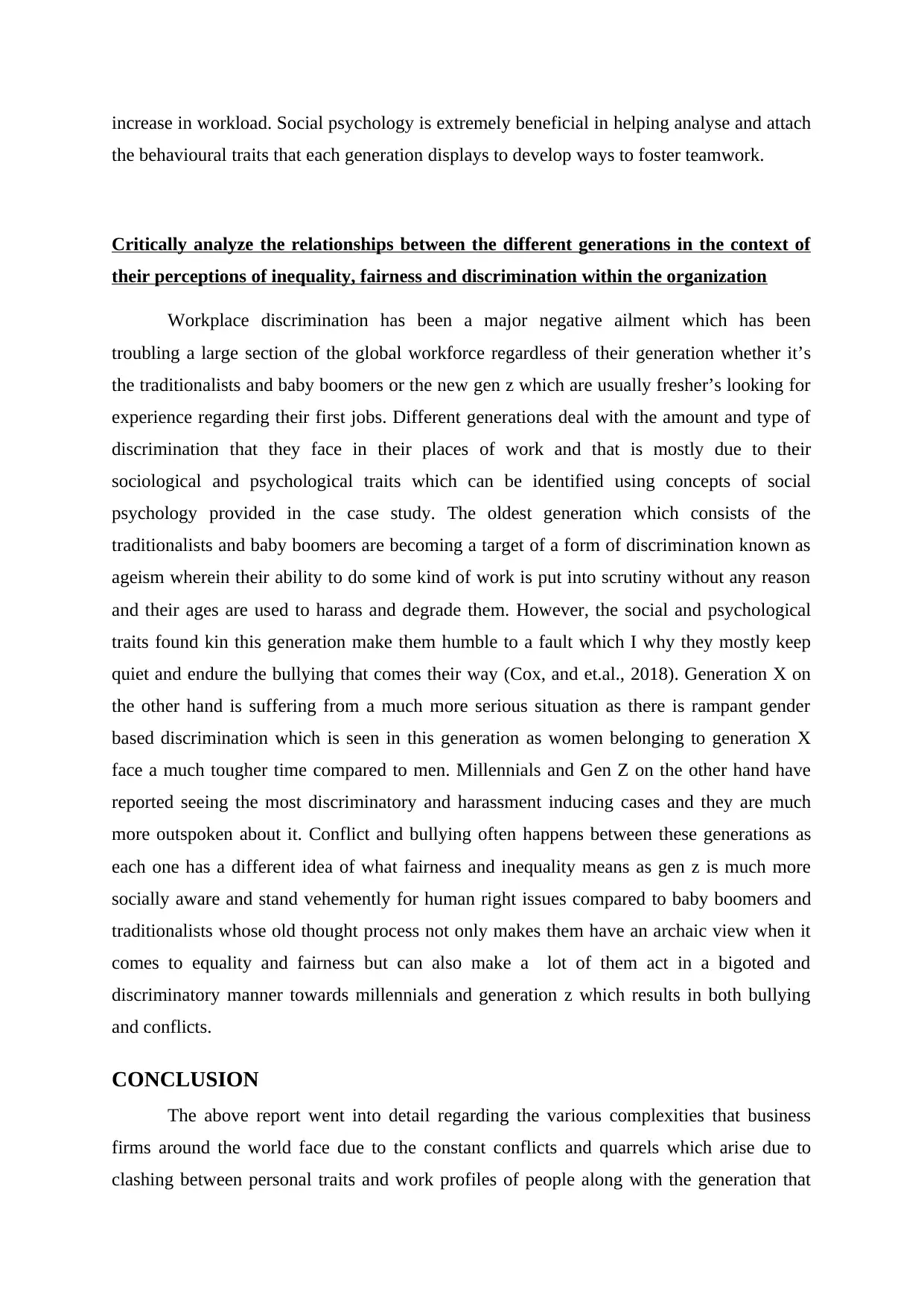
increase in workload. Social psychology is extremely beneficial in helping analyse and attach
the behavioural traits that each generation displays to develop ways to foster teamwork.
Critically analyze the relationships between the different generations in the context of
their perceptions of inequality, fairness and discrimination within the organization
Workplace discrimination has been a major negative ailment which has been
troubling a large section of the global workforce regardless of their generation whether it’s
the traditionalists and baby boomers or the new gen z which are usually fresher’s looking for
experience regarding their first jobs. Different generations deal with the amount and type of
discrimination that they face in their places of work and that is mostly due to their
sociological and psychological traits which can be identified using concepts of social
psychology provided in the case study. The oldest generation which consists of the
traditionalists and baby boomers are becoming a target of a form of discrimination known as
ageism wherein their ability to do some kind of work is put into scrutiny without any reason
and their ages are used to harass and degrade them. However, the social and psychological
traits found kin this generation make them humble to a fault which I why they mostly keep
quiet and endure the bullying that comes their way (Cox, and et.al., 2018). Generation X on
the other hand is suffering from a much more serious situation as there is rampant gender
based discrimination which is seen in this generation as women belonging to generation X
face a much tougher time compared to men. Millennials and Gen Z on the other hand have
reported seeing the most discriminatory and harassment inducing cases and they are much
more outspoken about it. Conflict and bullying often happens between these generations as
each one has a different idea of what fairness and inequality means as gen z is much more
socially aware and stand vehemently for human right issues compared to baby boomers and
traditionalists whose old thought process not only makes them have an archaic view when it
comes to equality and fairness but can also make a lot of them act in a bigoted and
discriminatory manner towards millennials and generation z which results in both bullying
and conflicts.
CONCLUSION
The above report went into detail regarding the various complexities that business
firms around the world face due to the constant conflicts and quarrels which arise due to
clashing between personal traits and work profiles of people along with the generation that
the behavioural traits that each generation displays to develop ways to foster teamwork.
Critically analyze the relationships between the different generations in the context of
their perceptions of inequality, fairness and discrimination within the organization
Workplace discrimination has been a major negative ailment which has been
troubling a large section of the global workforce regardless of their generation whether it’s
the traditionalists and baby boomers or the new gen z which are usually fresher’s looking for
experience regarding their first jobs. Different generations deal with the amount and type of
discrimination that they face in their places of work and that is mostly due to their
sociological and psychological traits which can be identified using concepts of social
psychology provided in the case study. The oldest generation which consists of the
traditionalists and baby boomers are becoming a target of a form of discrimination known as
ageism wherein their ability to do some kind of work is put into scrutiny without any reason
and their ages are used to harass and degrade them. However, the social and psychological
traits found kin this generation make them humble to a fault which I why they mostly keep
quiet and endure the bullying that comes their way (Cox, and et.al., 2018). Generation X on
the other hand is suffering from a much more serious situation as there is rampant gender
based discrimination which is seen in this generation as women belonging to generation X
face a much tougher time compared to men. Millennials and Gen Z on the other hand have
reported seeing the most discriminatory and harassment inducing cases and they are much
more outspoken about it. Conflict and bullying often happens between these generations as
each one has a different idea of what fairness and inequality means as gen z is much more
socially aware and stand vehemently for human right issues compared to baby boomers and
traditionalists whose old thought process not only makes them have an archaic view when it
comes to equality and fairness but can also make a lot of them act in a bigoted and
discriminatory manner towards millennials and generation z which results in both bullying
and conflicts.
CONCLUSION
The above report went into detail regarding the various complexities that business
firms around the world face due to the constant conflicts and quarrels which arise due to
clashing between personal traits and work profiles of people along with the generation that
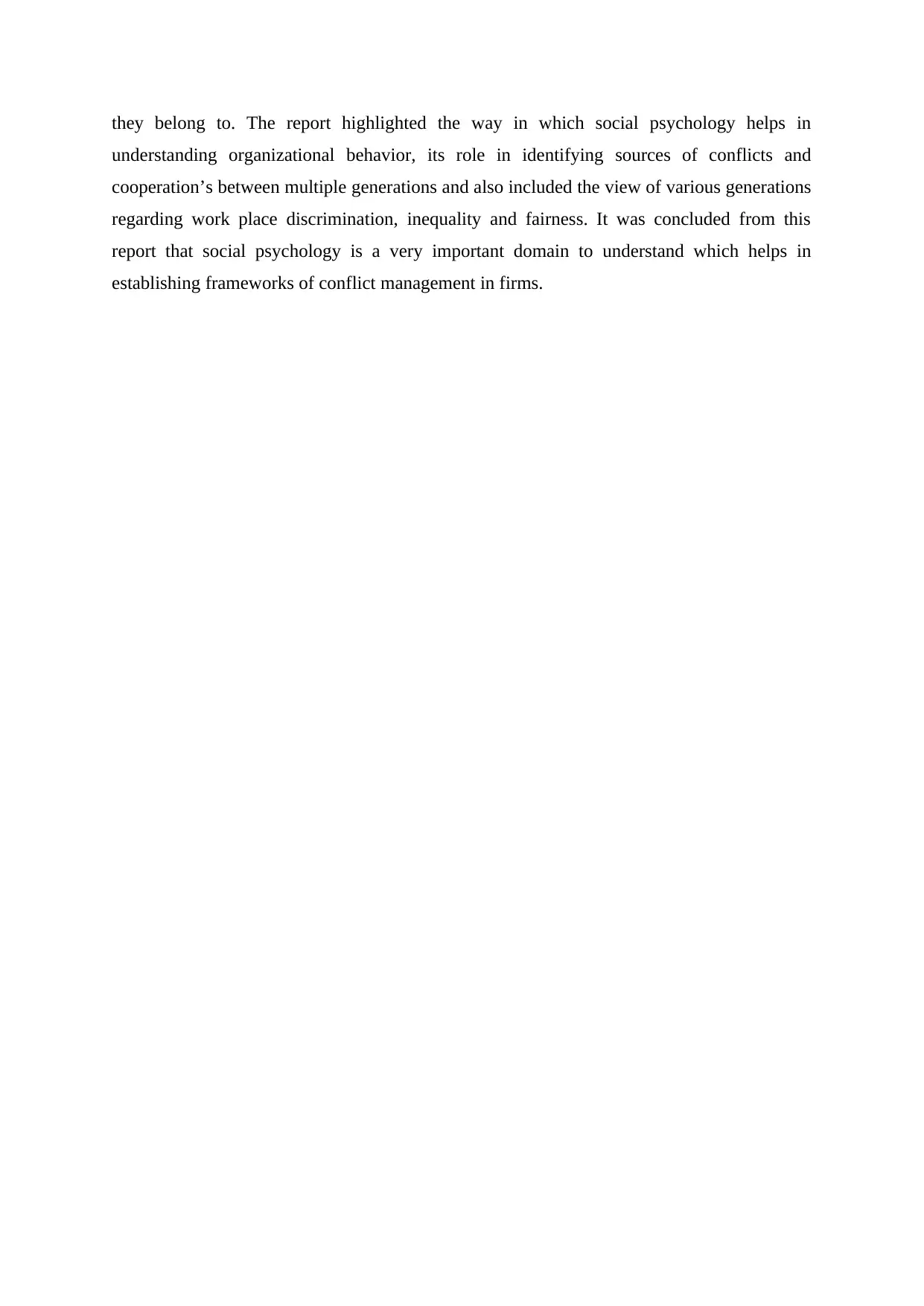
they belong to. The report highlighted the way in which social psychology helps in
understanding organizational behavior, its role in identifying sources of conflicts and
cooperation’s between multiple generations and also included the view of various generations
regarding work place discrimination, inequality and fairness. It was concluded from this
report that social psychology is a very important domain to understand which helps in
establishing frameworks of conflict management in firms.
understanding organizational behavior, its role in identifying sources of conflicts and
cooperation’s between multiple generations and also included the view of various generations
regarding work place discrimination, inequality and fairness. It was concluded from this
report that social psychology is a very important domain to understand which helps in
establishing frameworks of conflict management in firms.
⊘ This is a preview!⊘
Do you want full access?
Subscribe today to unlock all pages.

Trusted by 1+ million students worldwide
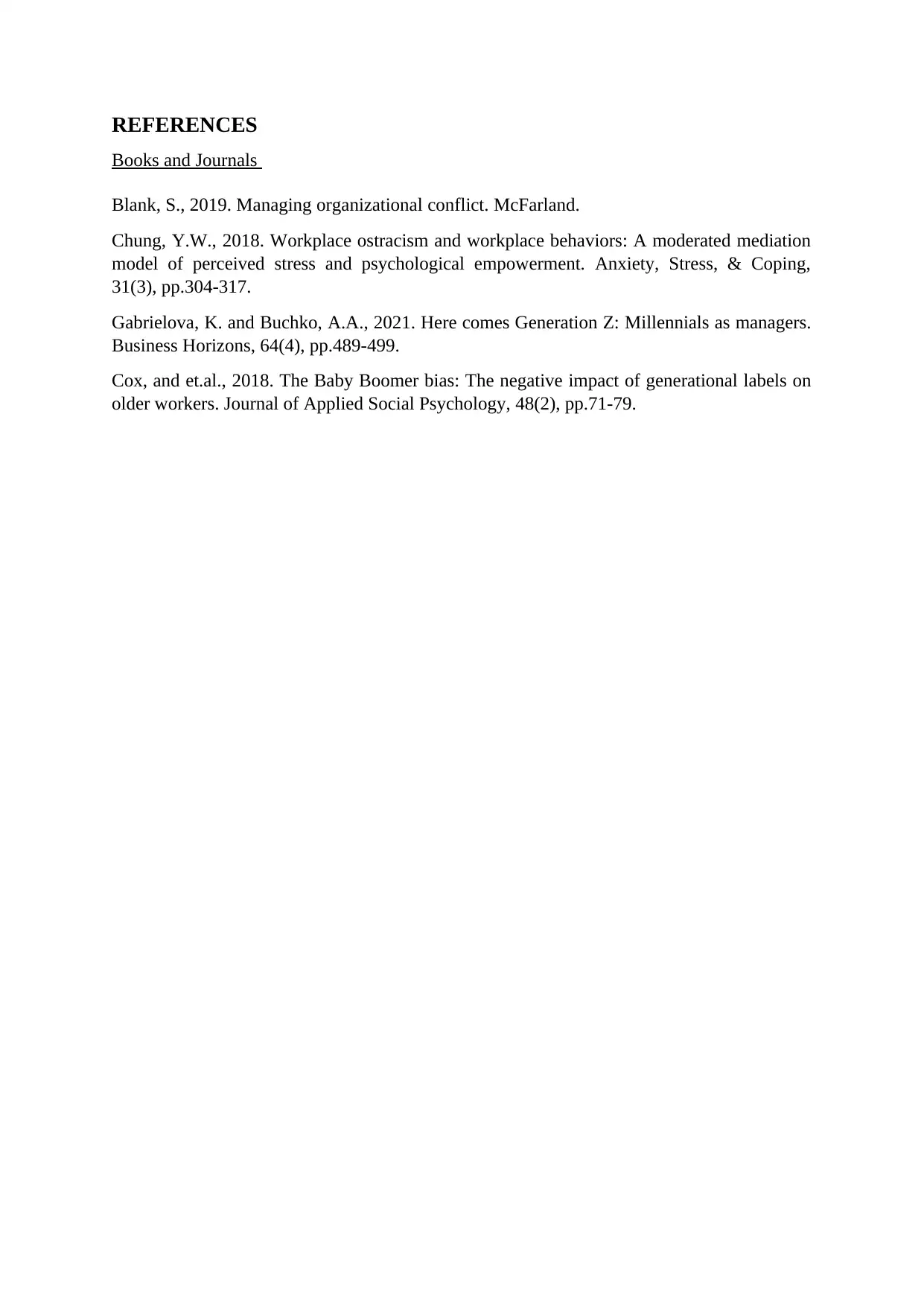
REFERENCES
Books and Journals
Blank, S., 2019. Managing organizational conflict. McFarland.
Chung, Y.W., 2018. Workplace ostracism and workplace behaviors: A moderated mediation
model of perceived stress and psychological empowerment. Anxiety, Stress, & Coping,
31(3), pp.304-317.
Gabrielova, K. and Buchko, A.A., 2021. Here comes Generation Z: Millennials as managers.
Business Horizons, 64(4), pp.489-499.
Cox, and et.al., 2018. The Baby Boomer bias: The negative impact of generational labels on
older workers. Journal of Applied Social Psychology, 48(2), pp.71-79.
Books and Journals
Blank, S., 2019. Managing organizational conflict. McFarland.
Chung, Y.W., 2018. Workplace ostracism and workplace behaviors: A moderated mediation
model of perceived stress and psychological empowerment. Anxiety, Stress, & Coping,
31(3), pp.304-317.
Gabrielova, K. and Buchko, A.A., 2021. Here comes Generation Z: Millennials as managers.
Business Horizons, 64(4), pp.489-499.
Cox, and et.al., 2018. The Baby Boomer bias: The negative impact of generational labels on
older workers. Journal of Applied Social Psychology, 48(2), pp.71-79.
1 out of 7
Related Documents
Your All-in-One AI-Powered Toolkit for Academic Success.
+13062052269
info@desklib.com
Available 24*7 on WhatsApp / Email
![[object Object]](/_next/static/media/star-bottom.7253800d.svg)
Unlock your academic potential
Copyright © 2020–2025 A2Z Services. All Rights Reserved. Developed and managed by ZUCOL.





